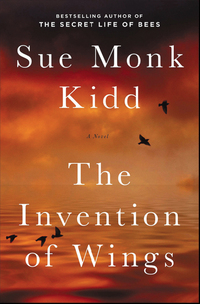Over the years, I have come to regard Sue Monk Kidd as one of my favorite historical fiction authors. In her most recent book, The Invention of Wings, she does not disappoint with her poignant telling of a story of two sisters, daughters of an aristocratic family in Charleston, South Carolina who speak out against slavery and the dehumanizing of both slaves and women when slavery was at its height prior to the Civil War.
At age seven, Sarah Grimke is given a slave girl named Hetty Handful for her birthday. Sarah promptly rejects this gift, stating that people are not property that one person can give another. Her parents do not listen to Sarah and both she and Hetty have no voice in the matter. Sarah secretly begins teaching Hetty to read and, over the years, their relationship develops.
A parallel runs throughout the story of Sarah being a free white person who is chained to her family’s belief in slavery and, when she becomes a young woman, the chains that women endured in being property of their husbands and the rules of society. Sarah is also a slave.
As the story unfolds, Sisters Sarah and Angelina Grimke, young ladies of piety and gentility who moved in the elite circles of society until, acting upon their personal convictions that slavery was inhumane, were forced to break from their family, their religion, their homeland, and their traditions, becoming exiles and eventually pariahs in Charleston.
Long before others were writing about the emancipation of slaves, Sarah and Angelina wrote and spoke about racial equality, an idea that was radical even among abolitionists.
While this book is fiction, it is closely based upon Sarah and Angelina’s real lives.
There are many details included that are based upon the history of the Old South.
Kidd tells the story in such a way that even though I have read many books on this topic, I “saw” slavery in a new light and marveled at the heroic way the sisters and Hetty lived their lives. This book is a must read for anyone who is interested in slavery, women’s rights, and our country’s history.
Kidd writes that she was inspired to write this book by the words of Professor Julius Lester: “History is not just facts and events. History is also a pain in the heart and we repeat history until we are able to make another’s pain in the heart our own.”
The library has Sue Monk Kidd’s other books Traveling with Pomegranates: A Mother-Daughter Story and When the Heart Waits: Spiritual Direction for Life’s Sacred Questions, both nonfiction; The Mermaid Chair and The Secret Life of Bees, both fiction.



